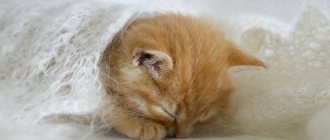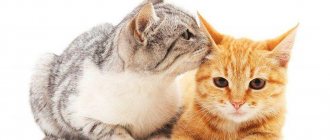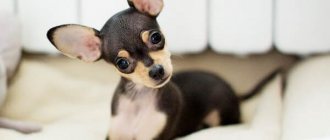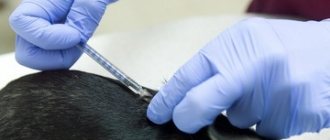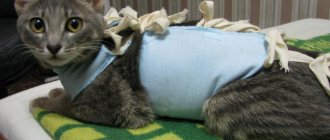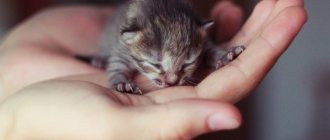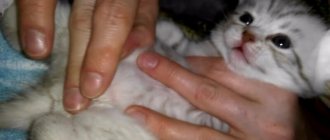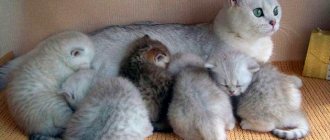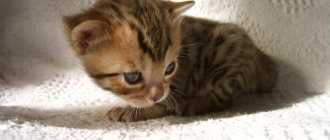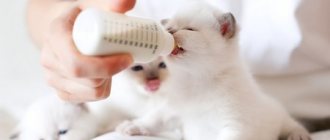A new addition to a cat family is a good event, because it is a joy not only for the cat itself, but also for its owners. Little fluffy balls, with their helplessness, make people want to protect them as if they were their own children. At first, the only reference point for babies is their mother, but when the kittens’ eyes open, a new stage in learning about the wonderful world begins. And although the mother cat must take care of the kittens, the owner is obliged to monitor the growth of the babies, periodically weighing them and observing when their eyes begin to open, ears rise, and teeth erupt.
Why are kittens born with their eyes closed?
During pregnancy, a cat bears offspring for 55-60 days, the babies are born absolutely helpless and defenseless. On average, a domestic cat gives birth to three to eight kittens (primiparous cats have fewer). Babies can only feel the warmth of their mother and need her love and care more than ever. The first thing kittens begin to react to is the smell of warm mother's milk. Newborns still cannot do many things: see, hear, empty themselves, control their body temperature.
A newborn kitten needs its mother more than ever
Many mammals are born blind, and there is an explanation for this. If the kitten’s eyelids were not closed at birth, then particles of dust and dirt could get into the eyes, which would negatively affect the baby’s vision. There is another reason: if a cat carried kittens longer than usual in order to later give birth to them more independent, she would risk her own life, because it is inconvenient to carry offspring growing every day in her stomach. Wild cats also give birth to babies in burrows, where sand can fall on the newborns’ eyes, and crawling all over the nest, the kittens could injure their eyesight with a twig or stone.
Additional Information! In horses, for example, everything is different: a mare’s pregnancy lasts 11-12 months, but one foal is born sighted and within a few minutes is on its feet and walking.
Cat brain
Does your cat react when you call its name?
Can a cat distinguish your voice from a stranger's voice?
Can a cat find a toy hidden behind a large object, such as a closet?
If the answer to all these questions is YES
, this means your cat is quite smart.
At least, this is reported by feline behaviorist
Kristin Vitale at the Human-Animal Interaction Laboratory at the University of Oregon
Today Felis silvestris catus
(the official name of the cat) is one of the smartest animals on Earth. According to the specialist, this may be due to the flexibility of cats in terms of behavior.
Marvelous
, but to date, relatively little research has focused on cat cognition or internal mental processes, especially compared to the significant amount of research on the psyche of dogs.
Why with open
When puppies open their eyes after birth
Most often, only sphinxes can be born with open eyes; in other cases, the birth of babies with open eyes is the result of a disorder during pregnancy. It looks a little strange or even scary, but you shouldn’t immediately rush into panic or sign the little ones’ death warrant. In this case, you need to move the cat with the litter to a dark place and protect the delicate tissues of the eyes from mechanical damage and light for two weeks, since small kittens do not yet know how to blink. You can even trim the claws of littermates so that they don’t accidentally scratch such a baby’s eyes. After fourteen days, eye formation will return to normal, and the baby will grow up sighted and healthy. If the situation has not improved or even worsened, then it is necessary to urgently contact a veterinarian, as vision-threatening diseases leading to complete blindness are possible.
To moisturize the cornea, it is best to use a special gel “Vidisik” (sold in a regular pharmacy). The application scheme is simple: wipe the kitten’s eye with a sterile napkin, apply one drop of gel and gently massage the eye (carefully place two fingers on the edge of the lower eyelid and move in a circular motion to the other side), and then repeat the above algorithm with the other eye. It will be enough to carry out this procedure three times a day to maintain an appropriate level of humidity. Sometimes breeders recommend covering the baby's eyelids with an adhesive plaster, but this may not always help. It is enough just to keep the vulnerable cornea from the harmful effects of bright light and keep it from drying out, and then the visual organs themselves will begin to form as they should.
In what cases should you contact a veterinarian?
An alarming signal is a long refusal to go to the toilet, as well as the presence of too dry or excessively loose stools. In these cases, you should not postpone going to the veterinarian. This same advice applies to those cases when a kitten does not visit the litter box for more than a day and its fur begins to smell unpleasant.
If it is noticed that the urination process causes discomfort to the cat, the amount of urine produced is too small, you should regard these as quite dangerous symptoms and immediately contact a veterinary clinic. The sooner you see a doctor, the sooner treatment will begin.
No less obvious signs of pathology requiring specialist intervention are the presence of blood, sand, or mucus in the urine, a swollen tummy, fever, lack of appetite, apathy, dry ears and nose.
When do kittens' eyes open after birth?
How long after giving birth can a cat become pregnant?
About what day do kittens open their eyes? On average - by 5-10, and they do not do it in an instant. First, the slits will widen, and the eyelids will gradually begin to separate from each other, and after a couple of days they will open completely. Sometimes it happens that first one eye opens, then the other. A few days later the baby will learn to blink.
How many days after birth
At this time, the organs of vision are still developing, so melanin, which determines the color of the kitten’s eyes, has not yet begun to be produced, and the color of the shell will first be gray-blue. Only by six months will the final eye color, determined by heredity, gradually develop.
Just because the eyes are open does not mean that the kitten is sighted. When babies open their eyes, they still practically do not see the picture of the world. This baby only reacts to lighting. A little later, he will see only blurry and moving objects at a distance of up to three meters, then he will learn to distinguish colors and eventually gain full vision. On such days, the baby is kept in semi-darkness to protect the delicate cornea from blinding bright light.
All newborn kittens have blue eyes.
What affects the term
There are many factors that determine the day a kitten’s eyes open:
- breed. In kittens of hairless and short-haired breeds, the eyes open earlier than in large and long-haired ones. For example, it is completely normal for Sphynx or Devon Rex kittens to open their eyes 3-5 days after birth. But in fluffy Ragdolls or Persians, the eyes begin to open only after two weeks, or even later;
- mother's gestational age. If the cat gave birth ahead of schedule, then in premature kittens the opening of the eyes will happen later than expected, but if she carried the offspring for too long, then this will happen earlier. Floor. Often, newborn females begin to become sighted earlier compared to males;
- heredity. The speed of development of a kitten largely depends on genetics. If in the kitten’s family most cats opened their eyes earlier than the standard period, then it will be the same with this baby;
- illumination of the nest. Where there is constant twilight in the nest, the kittens will open their eyes a little earlier.
Note! It is not always necessary to make the conditions for a kitten’s development ideal; care is required only in special cases. Basically, you just need to protect the kids from too bright light and not disturb them too much. Babies will still sleep most of the time while they grow.
Beginning of the second month of life
In the fifth week, the crumbs become simply unrecognizable. It seems that these “hooligans” have nothing in common with those motionless babies who were located in the nest about a month ago: they already run deftly, improve their sense of balance, can bypass obstacles, sneak up from behind and attack. By this time they are already showing concern for each other.
5 weeks is a turning point in the kitten’s nutritional system. At this age, you can try offering him complementary foods. The ideal supplementary diet (the main one is still cat milk) is canned food for kittens.
Peculiarities of behavior of kittens aged 1.5-2 months
After a couple of weeks, by the middle of the second month of life, they still bear little resemblance to adult lazy cats. Kittens constantly communicate, move actively, run, play, and sharpen their nails. A month and a half is a great time to get your first worm vaccination. If there are potentially dangerous objects in the house within easy reach of animals, it is better to remove them. This is about:
- all kinds of chemicals, detergents;
- first aid kit with medications;
- needles, pins, pushpins;
- electrical outlets;
- poisonous indoor plants, etc.
If the pet, at the request and insistence of the owner, is expected to engage in grooming in the future, then the basics of this area must be taught at 7-8 weeks. You should start with simple procedures, let the baby get used to bathing, combing fur, and cutting nails. Of course, by 2 months his claws have not yet become dangerous to others, like those of an adult animal, so there is no need to really trim them. It is important at an early age to accustom the kitten to the position in which this procedure will then take place.
At 8-9 weeks, all baby teeth are usually in place. With breastfeeding, many owners try to separate the babies and completely switch the kittens to “adult” food. Games and contact with people are especially important for small pets, so it would be better if all family members find at least 15-20 minutes every day to communicate with their pet.
Eye opening depending on cat breed
Maine Coon
Development of kittens by week and by day after birth
The Maine Coon is one of the most popular cat breeds, known throughout the world for its impressive dimensions. Sometimes cats of this breed reach a weight of 15 kilograms. Maine Coons belong to that group of breeds whose kittens open their eyes no earlier than two weeks later. After this point, it is important to regularly wash your eyes with chamomile infusion or black tea for some time.
In a British cat
The British are sophisticated and sophisticated cats that make excellent company for any person. Like all kittens, babies of this breed can sense the level of light in the first days, but only between the 6th and 14th days of life will their eyes open. In this case, it is recommended to keep the nest in twilight and care for the growing babies.
And other breeds
As mentioned earlier, the trend is quite simple: kittens of long-haired breeds open their eyes much later than short-haired and hairless ones. Based on the day the eyes open, scientists distinguish several groups of breeds: hairless and Siamese, which become sighted earlier than others; short-haired, whose eyes open for up to two weeks; large breeds and long-haired with the slowest development.
More facts about eye opening in kittens:
- Sometimes sphinxes are born with their eyes open, but in this case they need special care in the first week. Typically, Sphynx cats begin to open their eyes 3-4 days after birth;
- graceful and graceful cats of Siamese and other “oriental” short-haired breeds open their eyes on the 4-5th day;
- when Abyssinian kittens' eyes open, they are already 4-5 days old;
- Scottish Fold kittens are slightly fluffier than shorthaired kittens, so they begin to open their eyes at 4-7 days. This is due to the presence of a soft and thick undercoat;
- colorful Bengal babies open their eyes on the 10th day of life. But bobtails tend to lag a little. Their babies begin to open their eyes only at 8-10 days;
- in Siberian and Persian babies, such an important event occurs on the 12th or even 18th day of life;
- fluffy and huge ragdolls begin to open their eyes only 15-17 days after birth.
The day the eye opens varies depending on the breed of the kitten.
Socialization period
This stage lasts from approximately three to ten weeks. During this period, the development of kittens is associated with the distribution of social roles. The owner can notice the developed character of the kids.
At this stage, the final formation of self-care skills and the instillation of cleanliness occurs, when kittens learn to go to the litter box and wash themselves.
Around this time, the kittens' first vaccination and medical examination take place. Your veterinarian can create a complementary feeding plan as animals gradually wean themselves off their mother's milk. But, despite the apparent maturity and independence, it is still not recommended to separate kittens from their mother.
Hurry up, choose a box and find out what gift awaits you
Discount on pet insurance
Promo code copied to clipboard
When do kittens start to hear?
Hearing, like vision, is an integral part of a cat, because thanks to its acute and sensitive hearing it can hunt. Newborn kittens are blind and deaf due to their still poorly developed nervous system, so they are completely and completely dependent on their mother. Kittens learn to hear earlier than when they begin to open their eyes. This mainly happens on days 5-8, as the ear canal gradually begins to open. At first the baby's ears are flattened, but then they will rise.
Important! During the period of hearing formation, it is necessary to provide the kitten with peace and quiet.
As with vision, the rate at which a kitten develops depends on what breed it belongs to. Often, kittens of short-haired breeds begin to see and hear faster than their fluffier counterparts.
At first, kittens only sleep, sometimes waking up to eat. For this reason, lack of vision does not affect their life activities. After some time, when the kittens open their eyes, they become mobile and active. If the owner takes part in caring for the babies, all his efforts will pay off with the invaluable trust of the cat.
Possible problems and deviations
Treatment of the problem must begin immediately after its appearance. Otherwise, the pet may remain disabled.
Pain and weakness of the limbs are characteristic of the following pathologies:
- hip dysplasia, expressed in abnormal tissue development;
- liver diseases complicated by neurological disorders;
- acute intoxication;
- primary (arthritis) and secondary (trauma) dysfunctions of the musculoskeletal system;
- rickets, characterized by softening of the bones;
- malignant neoplasms.
The risk group includes Maine Coons. Due to active growth and large dimensions, 23% of representatives of this breed suffer from dysplasia. Their weight gain outpaces the development of joints, so the body simply cannot cope with the load placed on it. Also, this pathology can be inherited, and its presence must be recorded in the pedigree.
Please note that an animal suspected of being injured should not be transported. Shaking on the road can aggravate his condition, so it is better to call a doctor at home.
Understanding Human Reaction
Scientists in Christine Vitale's lab are studying how cats understand and respond to social cues, specifically a person's emotional response to an unfamiliar situation.
In one test, scientists told the cat owner to either be afraid
, or enjoy a fan that might seem scary to a cat.
Next, the researchers looked at whether the cat picked up on human emotional signals. If the owner is afraid
, does the cat look at the object with caution?
And if the owner is happy
, does the cat try to interact with the object?
Smart cats understand the emotional state of their owners.
In one study, owners and their cats walked in together
to the laboratory. Then the scientists “took” the owner out of the room, leaving the cat alone.
In 2 minutes
the owner returned to reunite with the cat. Here's what scientists noticed:
Some cats met their owner
, and then went back to explore the room. These cats were strongly attached to their owner.
Another group of cats
after the owner returned, she was dissatisfied with his departure, and therefore began to scratch him.
But there was a third group
, which did not react in any way to the return of a familiar person - these cats simply sat and ignored everything that was happening. This is due to the fact that they have long established a connection with the owner.
These attachment styles may correspond to the earliest weeks and months of a cat's life.
Research into how early perceptual experiences influence brain development has shown that cats between 3 and 9 weeks of age need to spend more time and interact with people to develop healthy behaviors.
In other words , early exposure to people tends to develop friendlier cats.
Object permanence: if something is missing, it still exists
Another interesting aspect
, which was studied early on, is “object permanence,” the understanding that when an object disappears from view, it continues to exist.
Several studies have shown that cats can easily pass tests
, in which they see an object disappear and then try to find it where they last saw it. Researchers say cats not only solve these tests easily, but the older they are, the better they perform at the tasks.
Symptoms of suppuration
Suppuration is visible to the naked eye. Usually the pus dries out and forms a light gray crust. Dried drops form on the fur in the area of the eyes and nose. Too much discharge can even “glue” the eye and it will not open. Kittens will try to remove the formations by washing, but this can only worsen the situation: the infection will spread, and the results will not be the most pleasant.
Pus may be white, yellow, green, or brown in color
It is important to pay attention if your pet frequently blinks or squints, rubs its eyes with its paws, or sneezes. Older kittens may hide in secluded places. If the baby was active and playful, but suddenly became apathetic, then this is a clear reason to examine him and see a doctor.
If the baby was active and playful, but suddenly became apathetic, then this is a clear reason to examine him and see a doctor.
Symptoms can tell what disease the kitten’s body has been exposed to. Here are the most common:
Sour eyes, snot, inflamed and red eyelids. The cause is conjunctivitis. It is divided into four groups according to the nature of the disease. Infectious occurs against the background of irritation of the mucous membrane (dust, chapping, other external irritants).
Viral is a symptom of a contagious disease that develops covertly or acutely.
Chronic occurs when the eyes are dry, the nasolacrimal ducts do not work properly, and ulcers form on the corneas.
Allergies develop against the background of constant stimulation of the immune system by allergens. Purulent eyes, severe runny nose, wet cough, sneezing, upset stomach. The cause is toxoplasmosis, a parasitic disease. Usually occurs in outdoor kittens. Swelling, severe pain, the kitten reacts sharply to any touch in the eye area. The cause is blockage of the tear ducts. Usually occurs in babies up to three weeks of age. Pain and discomfort are caused by the accumulation of pathological exudate in the lacrimal canal. Swollen eyes, sneezing, coughing, purulent discharge. The cause is chlamydia. The infection affects not only the mucous membranes of the eyes, but also the respiratory tract, digestion and genitals. Purulent eyes, cough, rhinitis. The cause is mycoplasmosis. The infection first affects the organs of vision, and then the respiratory system. If treatment is not started in time, the kitten will develop diseases of the genitourinary system, liver and joints. Your eyes hurt, tears flow, your eyelids swell. The owner observes that the animal has inflamed eyes, eyelids stuck together from pus and ichor, bleeding and bruising are possible. Cause: Injury
It is important to start treatment in a timely manner, otherwise bacteria will penetrate through small wounds.
Cat's internal clock
Another study tried to understand whether cats have an internal clock.
According to scientists, cats have them because they lead an active lifestyle at dusk and dawn. It is important for them to know when to hunt and when to rest.
It is noteworthy that when cats live next to us
, they are smart enough to change their natural behavior. The man got out of bed, which means this is a signal. It's getting lighter outside, which means it's time to eat. Cats make different connections and this is called associative learning.
On the eve of childbirth
Usually a woman in labor copes with childbirth on her own, but a responsible owner should keep ready everything that may be useful during childbirth: clean towels, disposable diapers and gauze napkins, scissors and thick threads in case you have to cut the umbilical cord yourself, boiled water and a first aid kit, the contents of which should be discussed with your veterinarian in advance.
If your pet is constantly being observed by the same doctor, ask him for a phone number before giving birth in case of unforeseen circumstances or find contacts of a veterinary hospital where 24-hour consultation is available. Also make sure that you can go to the nearest veterinary clinic at any time, which is always open and you know the way to it and its exact address, in case you have to get there by taxi or on your own.
Childbirth is a moment of crisis for any cat and requires control from the owner
If a cat gives birth safely at home, she will eat the afterbirth after the kittens - this is absolutely normal. Some experts believe that it is enough to give the cat the afterbirth of only one kitten - especially if she has problems with the gastrointestinal tract. By the way, if the labor is long, then it is allowed to feed and water the woman in labor - this will give her strength. After giving birth, you need to clean the nest and leave the cat alone - she will have to carefully lick and feed each kitten.
Follows the finger
Early training can help cats
tune in to human signals such as finger pointing.
One study found that cats can find food when a person points it out.
More recent research shows that cats can even distinguish between human voices.
People view cats as independent, aloof, and selfish.
But when they see how social these animals can be, the debate stops. It is very important to understand their behavior and how they see and understand the world around them.
Keep warm
Warmth is no less important for babies. Usually their mother warms them with her warmth, and her body temperature is two degrees higher than a human’s.
If kittens are weaned from their mother, you need to provide a source of heat in their den - for example, a bottle of hot water, always wrapped in several layers of natural fabric so that the babies do not get burned! They should also have the opportunity to move away from the bottle if necessary. It is better not to use electric heating pads due to their dependence on surge voltage and difficulty regulating temperature.
It is important for kittens to maintain a constant body temperature
Eight weeks
By eight weeks, babies already have all their teeth and therefore this time is the most favorable for separating them from their mother. If you are lucky enough to become the owner of a kitten, then first of all, before you bring it into your home, go to the veterinarian and complete the entire mandatory prevention program. Since the kitten is becoming more and more independent, begin to accustom it to proper care - brush its fur more often with a brush and carefully examine its ears, mouth and other parts of the body that are inaccessible to the pet. To make the separation of a small pet from its mother and siblings less painful, try to grab for the first time some objects that are very familiar to the baby. And having brought him to a permanent place of residence, allow the kitten to explore the unfamiliar territory on his own and personally - this way he will be able to more smoothly enter his new life on a psychological level. Therefore, if there are children in your family, then do not let them interfere with the kitten in this and then come to you. Due to the fact that the kitten has already become more independent and very curious, try to protect the little explorer from various troubles: electricity, poisonous flowers, very small objects, etc.
